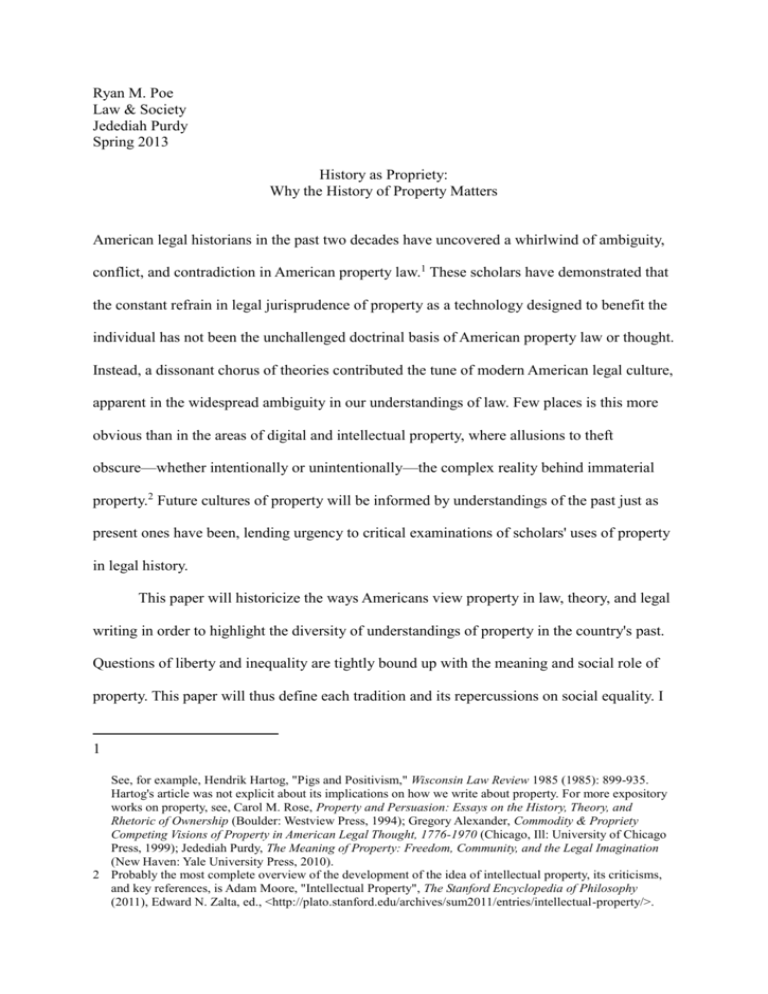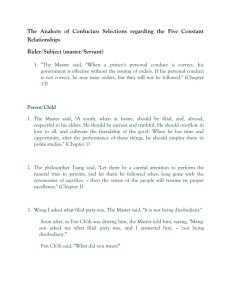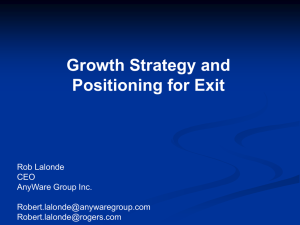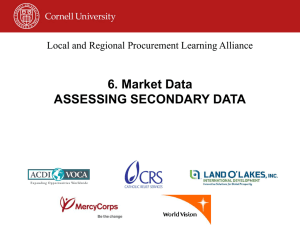Why the History of Property Matters
advertisement

Ryan M. Poe Law & Society Jedediah Purdy Spring 2013 History as Propriety: Why the History of Property Matters American legal historians in the past two decades have uncovered a whirlwind of ambiguity, conflict, and contradiction in American property law.1 These scholars have demonstrated that the constant refrain in legal jurisprudence of property as a technology designed to benefit the individual has not been the unchallenged doctrinal basis of American property law or thought. Instead, a dissonant chorus of theories contributed the tune of modern American legal culture, apparent in the widespread ambiguity in our understandings of law. Few places is this more obvious than in the areas of digital and intellectual property, where allusions to theft obscure—whether intentionally or unintentionally—the complex reality behind immaterial property.2 Future cultures of property will be informed by understandings of the past just as present ones have been, lending urgency to critical examinations of scholars' uses of property in legal history. This paper will historicize the ways Americans view property in law, theory, and legal writing in order to highlight the diversity of understandings of property in the country's past. Questions of liberty and inequality are tightly bound up with the meaning and social role of property. This paper will thus define each tradition and its repercussions on social equality. I 1 See, for example, Hendrik Hartog, "Pigs and Positivism," Wisconsin Law Review 1985 (1985): 899-935. Hartog's article was not explicit about its implications on how we write about property. For more expository works on property, see, Carol M. Rose, Property and Persuasion: Essays on the History, Theory, and Rhetoric of Ownership (Boulder: Westview Press, 1994); Gregory Alexander, Commodity & Propriety Competing Visions of Property in American Legal Thought, 1776-1970 (Chicago, Ill: University of Chicago Press, 1999); Jedediah Purdy, The Meaning of Property: Freedom, Community, and the Legal Imagination (New Haven: Yale University Press, 2010). 2 Probably the most complete overview of the development of the idea of intellectual property, its criticisms, and key references, is Adam Moore, "Intellectual Property", The Stanford Encyclopedia of Philosophy (2011), Edward N. Zalta, ed., <http://plato.stanford.edu/archives/sum2011/entries/intellectual-property/>. draw from scholars seeking to do the same, but also incorporate the methodologies that legal historians employ in their discussions of property. The way historians write about the past, I argue, matters just as much as our theories of property. Indeed, they are linked. For each alternative voice we silence, for each seemingly obscure tradition we ignore, the more our present seems like the culmination of an essential past. Contingency in historical scholarship is vital, for it signifies alternative futures just as it reminds us of the ambiguity, incompleteness, and possibility that contributed to the present. Ryan Poe History as Propriety Spring 2013 Gregory Alexander's analytical categories of theories of property serve as the departure point for my own analysis. Property, he argues, “has signified more than one message, more than one tradition for Americans.” He splits the property paradigm into a spectrum with two poles: property-as-commodity on one side, and property-as-propriety on the other. Property as commodity considers property solely as a commodity to be alienated by individual owners and maximized for their benefit in order to be traded in markets. Property's only functions are those related to its free exchange, and in sharply separating the private from the pubic. Private property signifies the sovereign domain of the property owner and absolute limit of state regulation, which is limited to regulating public property. The property as propriety view holds that private property exists as a social contract, arising out of mutual agreements between people, and thus the institution must serve the community before the individual. Yet, because it arose in service to society, property as propriety was also the material basis of the “proper” social order by mediating the relationships between people and anchoring citizens to their proper role in the social hierarchy.3 Although both ends of the spectrum are ideal types, property as commodity, he argues, has been (wrongly) considered the standard meaning of American property throughout its history. Legal scholars generally bifurcate along lines of emphasis: continuity of commodity, or heterogeneity encompassing both commodity and propriety. The former brand of historical inquiry depicts the long history of property in service to the individual and market commodity. These scholars are usually associated with Consensus-era historiography, Leftist 3 Alexander, Commodity & Propriety, pp. 1-4. 3 Ryan Poe History as Propriety Spring 2013 critiques of law and capitalism, and, since the 1970s, economic conservatism and neoliberalism. Consensus historiography4 influenced Wisconsin School functionalist accounts of legal history, exemplified in the writings of James Willard Hurst and his bevy of acolytes, such as Lawrence Friedman. To Hurst, the evolution of property law responded to changing social needs. Law met those needs by facilitating the creation of wealth and the release of what Hurst calls creative energies. “This it did,” he argues, “by committing to private hands legally protected control over the bulk of economic resources.”5 Lawrence Friedman puts it even more succinct when he argues that the dominant ideology in American land law “was that land should be freely bought and sold.”6 Although each author reserves a fair bit of nuance for their conclusions, the take away for each is clear: American law bolstered property commodification for the purposes of private development. Both portrayals (particularly Hurst's), and their intellectual offshoots, the evolutionary functionalists,7 are optimistic in their assertion that private property ultimately serves the public benefit. 4 Consensus historiography is that brand of historical scholarship committed to finding the essential elements of American history, politics, economics, and culture. They are usually associated with depicting moments of conflict and contingency as aberrations, and, as in the case of Richard Hofstadter's portrayal of Populism, demeaning radical challenges to the status quo. See, for example, Richard Hofstadter, The Age of Reform: From Bryan to F.D.R (New York: Knopf, 1955). 5 James Willard Hurst, Law and the Conditions of Freedom in the Nineteenth-Century United States (Madison: University of Wisconsin Press), p. 6-10. We should be careful not to caricature Hurst's argument, as he actually tried to argue against the idea that U.S. law served only the individual at the expense of the public historically. He was more concerned with illustrating that law developed in ways that were useful to society to maximize creative output. “Where legal regulation and compulsion might promote the greater release of individual or group energies,” he wrote, “we had no hesitancy in making affirmative use of law" (p. 7). It is his lack of contingency that lands him in this part of my analysis. 6 Lawrence Friedman, A History of American Law (New York: Simon & Schuster, 1973), p. 359. We should be even more careful about not caricaturing Friedman's text, as his aim was to write a general text book on American law. It is complex and nuanced, and he troubles his own statement later in the same passage. For instance, he finds that this broke down the farther West one went, and things like squatter laws became more and more aligned against absentee ownership that flagrantly benefited private owners (p. 360). 7 Evolutionary functionalists have slightly different accounts than Hurst and Friedman. Scholars such as Ronald Coase and George Priest argue that modern systems of private property—and the legal regimes formed around the strict protection of individual property rights—emerged because they best served efficiency and accumulation. Robert Ellickson's work also bears mentioning here, as he uses similar 4 Ryan Poe History as Propriety Spring 2013 Leftist historians have been less optimistic. Morton J. Horwitz's The Transformation of American Law portrays Early American law as developing away from a form of property as propriety toward property as commodity. In just a short period of time after the Revolution, property transformed from one that anchored one's place on the feudal social hierarchy “into just another cash-valued commodity.” The legal regime, “once conceived of as protective, regulative, paternalistic and, above all a paramount expression of the moral sense of the community,” Horwitz writes, “had come to be thought of of as facilitative of individual desires and simply reflective of the existing organization of economic and political power.”8 Jennifer Nedelsky extends this argument, finding the roots of American liberal individualism in the language of the Revolution and its codification in the Constitution. She finds that the strict protection of property rights are incompatible with true democracy, because if the poor were truly enfranchised they would have no interest in preserving property rights.9 Many critiques of American government have originated in the idea that at least since the Early Republic, property as commodity has been the dominant ideology in American legal culture.10 methodologies to make the same claims about custom. Although he criticizes the idea that law was always the most authoritative rule-making body, the implications are similar: efficiency is preserved in both custom and law. Henry E. Smith more recently made a similar case. Ronald H. Coase, "The Problem of Social Cost," The Journal of Law and Economics 3, no. 1 (1960): 1-44; George L. Priest, "The Common Law Process and the Selection of Efficient Rules," The Journal of Legal Studies 6, no. 1 (1977): 65-82; Richard A. Posner, "A Reply to Some Recent Criticisms of the Efficiency Theory of the Common Law," Hofstra Law Review 9 (1980-1981): 775-794; Robert C. Ellickson, Order Without Law: How Neighbors Settle Disputes (Cambridge: Harvard University Press, 1991), p. 167; Robert C. Ellickson, "Property in Land," The Yale Law Journal 102, no. 6 (1993): 1315-1400; Henry E. Smith, "Semicommon Property Rights and Scattering in the Open Fields," The Journal of Legal Studies 29, no. 1 (2000): 131-169. 8 Morton J. Horwitz, The Transformation of American Law, 1780-1860 (Cambridge: Harvard University Press, 1977), pp. 48, 253. 9 Jennifer Nedelsky, Private Property and the Limits of American Constitutionalism: The Madisonian Framework and Its Legacy (Chicago: University of Chicago Press, 1990). 10 Similarly, Charles Sellers concludes, perhaps melodramatically, that the triumph of individualist, bourgeois liberalism set the stage for a two party system whose parties competed to see who could best blur the inherent contradiction between capitalism and democracy. Similarly, Gordon Wood dates the death of this idea to the American Revolution. Gordon Wood, The Radicalism of the American Revolution (New York: 5 Ryan Poe History as Propriety Spring 2013 The negative implications of this portrayal of property in American history outweigh its benefits. Depicting the past as merely the teleological roots of the present may give us comfortable straw men to tear apart, but it can be just as politically paralyzing to reformers as it is empowering to social critics. If the root problems of the present have gone unchallenged for so long, what chance do sincere activists have of altering the status quo? Moreover, depicting the past solely as some sort of proving ground for modern ideas, as evolutionary functionalists did, threatens to render overthrown notions and defeated movements as necessarily incompatible with progress. These positions cede the power of tradition to the forces of conservatism, many of whom would use that power to push their vision of the future. As Justice Antonin Scalia demonstrated in Lucas v. South Carolina Coastal Commission (1992), even in the halls of the Supreme Court, judges render verdicts based on this presumption of history. The result is new forms of maintaining the status quo based on the unsound notion that consensus and status quo are one and the same.11 The most vulgar assumptions about the virtues of private property as commodity emerge from neo-liberal accounts of property rights that have, in the last decade, been formative of many detrimental social policies. Peruvian businessman Fernando DE Soto defends property rights from two ideological standpoints. First, the degradation of natural resources is inevitable, he argues, without individual security in rights to improve and freely A.A. Knopf, 1992), pp. 269; Charles Sellers, The Market Revolution: Jacksonian America, 1815-1846 (New York: Oxford University Press, 1991), pp. 362-363. 11 Scalia was apparently aware of his dubious portrayal of U.S. history when pushed by Justice Blackmun. In footnote 15 of the majority opinion, he argues that any alternative view of history than the one her provided is “entirely irrelevant” because early takings without compensation “were out of accord with any plausible interpretation” of more recent provisions. Historical interpretation is also discussed in footnote 26 of Blackmun's dissent. At stake in the ruling was a vision property whereby individuals owned property (in the majority opinion) against a vision in which individuals merely rented it, or leased it from the state (in Blackmun's dissent). Both sides use history differently, but Blackmun, it bears mentioning, cites a number of legal historians. Scalia does not. Lucas v. South Carolina Coastal Commission, 505 U.S. 1003, 1992. See also, Alexander, Commodity & Propriety, p. 7. 6 Ryan Poe History as Propriety Spring 2013 transfer property as a market commodity. The former assumption—that investment does not occur without property rights—affords powerful government in protecting property rights but its weakness in regulating property in order to ensure that owners are free to maximize their individual wealth without fear of takings, distribution, or outside interference. The second ideological standpoint—also known as the tragedy of the commons—nakedly asserts that in the absence of secure property rights, the commons (unowned natural resources) is depleted by every group's innate urge to accumulate. Thus, the only solution to maximizing wealth and preserving the commons in society is through secure property rights, low transaction costs, and weak regulation.12 The attractiveness of these linked, widely denounced ideological positions has nevertheless led to the implementation of destructive policy initiatives the world over. Garrett Hardin's so-called tragedy of the commons13 is an ideological thought experiment based on the idea that without private property, people treat the world as their personal toilet and limitless piggy bank, leading inevitably to environmental ruin. An extension of classical liberal notions that private property and human development were linked,14 historians have uncovered evidential problems with his interpretations: societies and people without secure property rights do form systems for managing resources, improving the land, and ensuring 12 Hernando de Soto, The Other Path: The Invisible Revolution in the Third World (New York: Harper & Row, 1989). De Soto elaborated on his idea in, The Mystery of Capital: Why Capitalism Triumphs in the West and Fails Everywhere Else (New York: Basic Books, 2000). 13 Garrett Hardin, "The Tragedy of the Commons," Science 162 (December 13, 1968): 1243-1248. 14 This, for example, is indicative of David Hume's theory of property, which he sees as arising out of the civilization of man by forming bonds of mutual agreement, which lead to society. Through agreements to create secure institutions of property, Hume argues that our natural, inner drive to plunder ensures social stability and the maximization of wealth in the long term. David Hume, A Treatise of Human Nature: Being an Attempt to Introduce the Experimental Method of Reasoning into Moral Subject (1739), Book 3, Part 2, Section 2, “Of the Origin and Justice of Property.” For more on what scholars have called “four stages theory,” see Alexander, Commodity & Propriety, pp. 60-71, but particularly pp. 61-62; Jedediah Purdy, The Meaning of Property: Freedom, Community, and the Legal Imagination (New Haven: Yale University Press, 2010), pp. 38-40. 7 Ryan Poe History as Propriety Spring 2013 equitable use without law designating liberal theories of property ownership. The tragedy of the commons, then, is not one of binary rights to ownership of the commons, but is instead one of government and regulation.15 Despite its flaws, Hardin's idea remained popular due in part to its ideological attractiveness to neo-liberal thinkers like de Soto. His libertarian solutions to South American poverty made their way into World Bank policy in the 1970s. These initiatives, argue Jeremy Seabrook and Mike Davis, privileged those with the clearest titles to property, resulting in isolated local success stories punctuating a larger climate of neglect. “By demonstrating the ability, the courage, and the capacity for self-help of slum people,” argues Seabrook, neo-liberal poverty policy paved the way for “a withdrawal of state and local government intervention and support” for the impoverished.16 Furthermore, feminist scholars have demonstrated that in the rush to protect property owners and divide the private from the public, liberal individual theories and implementations of property law buttressed male power at the expense of women and other dependents. Although individual rights may have promised a break from feudal hierarchies, Carole Pateman argues that their rise in popularity in the eighteenth and nineteenth centuries owes to their ability to justify male power, not their promise to unleash individualist egalitarianism in the United States. In liberal property regimes, individualism emerges from 15 Perhaps the most comprehensive compilation of arguments against Hardin's thought experiment is George N. Appell, “Hardin's Myth of the Commons: The Tragedy of Conceptual Confusions,” Indiana University Working Paper, 1993, <http://hdl.handle.net/10535/4532> (accessed March 19, 2013). See also, Ellickson, “Property in Land,” pp. 1320. It should be noted that Hardin did not seem to advocate blanket privatization himself. He merely argued that unowned land was destined to either fall into disrepair or be picked clean by wanton foragers. To him, the solution was the elimination of the commons, resulting from full socialization, full privatization, or some mix thereof. However, many of those influenced him took his meaning to be, simply, that a neo-Malthussian crisis loomed that only full privatization can solve. 16 Jeremy Seabrook, In the Cities of the South: Scenes from a Developing World (New York: Verso, 1996), pp. 196-197; quoted in Mike Davis, Planet of Slums (Verso, 2006), p. 72. Mike Davis is extremely critical of neo-liberal policies, and especially Hernando de Soto, whom he describes as “the Messiah of people's capitalism” (p. 80). Neo-liberal property rights as solutions to poverty—and thus beneficial for public good—are popular, Davis maintains, because they offer the continuation of the status quo, the perpetuation of anti-statist economic policy, and general political placidity with the promise to end world poverty at the stroke of a pen. 8 Ryan Poe History as Propriety Spring 2013 property ownership in one's self, which forms the basis of negotiating contracts with others on an equal basis. Since every individual is supposedly free to contract their property in person, anyone surrendering their natural independence must do so either by their own free will or by some innate inferiority. Women, born into webs of dependence to their fathers, brothers, and husbands, have property in their person, but they can never master their own bodies. Moreover, male control of dependents' property in person affords men power in public, political spaces—spaces that are defined in opposition to private, apolitical, feminine spaces.17 As scholars of the U.S. South have shown, this was compounded in systems of racial slavery in which the enslaved could not legally own property, leading to the subjection of not only women, but of African and Native Americans, as well.18 Patriarchy and racial patriarchy, not egalitarianism, inhabits the core of liberal individual conceptions of property. 19 Feminist accounts of property as commodity undermine sharp distinctions between commodist and proprietist theories of property, and renders dubious the assertion from 17 Carole Pateman, The Sexual Contract (Stanford: Stanford University Press, 1988), ch. 3, especially pp. 3940. See also, Elizabeth Fox-Genovese, "Property and Patriarchy in Classical Bourgeois Political Theory," Radical History Review 1977, no. 14-15 (1977): 36-59. 18 Stephanie McCurry situates property firmly within the southern racial patriarchy at the opening of Masters of Small Worlds, pp. 5-7. See also, Laura Edwards, The People and their Peace: Legal Culture and the Transformation of Inequality in the Post-Revolutionary South (Chapel Hill: University of North Carolina Press, 2009), pp. 157-162, 249-250; Elizabeth Fox-Genovese, Within the Plantation Household: Black and White Women of the Old South (Chapel Hill: University of North Carolina Press, 1988); Victoria E. Bynum, Unruly Women: The Politics of Social and Sexual Control in the Old South (Chapel Hill: University of North Carolina Press, 1992), ch. 3; Alexander, Commodity & Propriety, p. 5, ch. 6. Cheryl Harris makes the case that property and whiteness became bound up in American law so that whiteness became empowered and protected as a property right (to exclude) at the explicit expense of African and Native Americans. Cheryl I. Harris, "Whiteness as Property," Harvard Law Review 106, no. 8 (1993): 1707-1791. See also, Elizabeth V. Mensch, "The Colonial Origins of Liberal Property Rights," Buffalo Law Review 31, no. 3 (1982): 635. 19 This is not to say that if only this historical bias against women or minorities were magically alleviated that law formed on the basis of property as commodity or its political forebear, liberal individualism, would portend an egalitarian utopia. Feminist scholars argue against these ideas because of how they disguise these intrinsic biases in order to justify a political placidity that preserves inequality in the name of limiting government expansion and protecting property rights (and thus, saving liberty from equality). Indeed, as scholars such as Norma Basch has found, the establishment of married women's property rights did not significantly alter the power dynamics between men and women. See Norma Basch, In the Eyes of the Law: Women, Marriage, and Property in Nineteenth-Century New York (Ithaca: Cornell University Press, 1982), p. 38. Basch is quoted alongside a wealth of research on gender and married women's property acts in Alexander, Commodity & Propriety, p. 422. fn. 1. 9 Ryan Poe History as Propriety Spring 2013 classically liberal thinkers who assert that their vision of property either facilitates greater egalitarianism, or is at least agnostic to the type of society it produces. As other scholars have found, all systems of property establish a particular social order. Proprietist thinkers and their biographers, however, make fewer evasions about the role of property in society. The debate, then, is over what kind of society is desired, not over whether or not such a goal is moral or achievable. Many even draw from the same historical sources used by commodists to underscore the complexity of Enlightenment thinkers in their theories of property. For example, influential theorists like William Blackstone and David Hume understood property as arising out of unspoken social agreements between people to surrender short-term self interest to benefit the long-term good of the community: surrender the ability to steal a neighbor's land now, and both parties have security of possession in the long run, after significant personal investment and improvement. According to such theories, property only exists as an institution to order society, usually in such a way as to maximize mutual benefit.20 There are two broad, largely compatible approaches for examining how property is constitutive of a particular social order. The first—chiefly by intellectual historians—is by examining legal doctrine, popular thought, and important social theorists. Critical legal scholars fit into this line of inquiry when they discuss property by problematizing its doctrinal consistency and its contradictory legacies.21 By “destabilizing tradition,” rather than depicting 20 Purdy, The Meaning of Property, pp. 2-3; Carol M. Rose, "Canons of Property Talk, or, Blackstone's Anxiety," Yale Law Journal 1998-1999, no. 108 (1998), pp. 613-623; Hume, A Treatise of Human Nature, Book 3, Part 2, Section 2. 21 I follow Carol Rose's logic here in discussing Critical legal interpretations of property. Actually, Rose describes three ways to discuss property in her essay. The first two, however, doctrinalist and evolutionary functionalist (which she labels utilitarian), describe the path to the present in different ways. They tend to be, in Gregory Alexander's terminology, commodist. Doctrinalists tend to be commodist because they examine the minutiae of court rulings that make up the basis of modern property law. Evolutionary functionalists tend toward property as commodity because they examine how law evolved to its most efficient forms, usually 10 Ryan Poe History as Propriety Spring 2013 legal doctrine as a logically consistent body of axioms, Critical scholars peel away the layers of contradiction and contestation that make up the stable veneer of American legal culture. Scholars such as Carole Pateman and historians of women and gender have uncovered the social order that individualist theories of property implicitly created.22 Others have uncovered recurrent traditions of what J.G.A. Pocock called civic republicanism running through American culture and politics. Civic republicanism posited that property was necessary for autonomy, which itself was required to become a virtuous, contributing member of a particular social order.23 Scholars in this tradition, such as Gregory Alexander, find such thought persisting in American political philosophy up to the present.24 The second way scholars approach property as social order is by finding historical evidence of its continuation in the day-to-day lives of their subjects. Legal pluralists, in particular, examine the interrelation between law and custom, challenging the supremacy of law to order society and demonstrating the legal contributions of people considered outside the annals of power.25 Property—whether in law, in custom, or played out in everyday 22 23 24 25 taking for granted that people solve disputes and form laws or customs on the basis of maximizing economic benefits and minimizing conflict. Doctrinalist conservatism is implicit, stemming from, Rose jokes, their lengthy intellectual investment in esoteric matters of legal doctrine. Evolutionary functionalists, assuming that people necessarily work toward efficiency and the maximization of wealth, necessarily associate time with progress. Carol M. Rose, "Canons of Property Talk, or, Blackstone's Anxiety," Yale Law Journal 19981999, no. 108 (1998), pp. 613-623. See above, p. 8, fn. 17. The full quotation, in Alexander, Commodity & Propriety, includes an overt attack on the idea that property exists only for trade and wealth maximization. The civic republican did not own property, Pocock wrote, “in order to engage in trade, exchange or profit; indeed, these activities were hardly compatible with the activity of citizenship.” See Alexander, Commodity & Propriety, p. 30-31; J.G.A. Pocock, “The Mobility of Property and the Rise of Eighteenth-Century Sociology,” in Virtue, Commerce, and History (Cambridge: Cambridge University Press), ch. 6. Alexander, Commodity & Propriety, pp. 4-7, 12-14, & ch. 1. See also, J. G. A. Pocock, The Machiavellian Moment: Florentine Political Thought and the Atlantic Republican Tradition (Princeton: Princeton University Press, 1975), ch. 15; Michael J. Sandel, Democracy's Discontent: America in Search of a Political Philosophy (Cambridge: The Belknap Press of Harvard University Press, 1996). There are several ways to approach even this goal. For examples of this, and broader discussions of pluralist legal history methodology, see, Hendrik Hartog, William Forbath and Martha Minnow, "Introduction: Legal Histories from Below," Wisconsin Law Review 1985 (1985): 759-766; Ellickson, Order Without Law (as an 11 Ryan Poe History as Propriety Spring 2013 narratives—meant different things to different people, so that its very definition (in law and in culture) became an arena for negotiating social order. In Dylan Penningroth's Claims of Kinfolk, the meaning of property for African Americans encompassed far more than their legal categories implied. For the enslaved, dense networks of people made claims to property based on the communal labor required to produce it, making property the material basis of kinship and community support networks. This vision of property ownership was not, as previous scholars argued, some amalgam of the slave experience and white culture gleaned through proximity, or arising as a mere shelter from subjugation.26 It instead involved complex lineages of African, Anglo, and distinctly American cultural elements that emerged during—but not solely in response to the conditions under—slavery. Property invested meaning in social networks, which themselves exerted much influence on property, making property at once acquisitive and an investment in social ties. These informal patterns of property-making clashed with the dynamism of post-emancipation legal change, leading to contradictory, messy legal structures and property arrangements in the South.27 Historical reality, of course, rarely allows for easy categorical associations between custom and propriety, law and commodity, as a simple reading of Penningroth's analysis might conclude. For example, Hendrik Hartog's famous article, “Pigs and Positivism,” put two conceptions of property in stark relief in his account over conflicts pertaining to pig ranging in the streets of early New York. To bourgeois urban reformers and their legal allies, example of econometric pluralism); Brian Z. Tamanaha, "A Non-Essentialist Version of Legal Pluralism," Journal of Law and Society 27, no. 2 (2000): 296-321. 26 Indeed, Penningroth is quick to dispel this reading of black culture as overly simplistic because it relies entirely on their relationship to white people. This tends to obscure or romanticize the experiences of black people, he argues, “whose understanding of economic and social life involved far more than their relations with white people.” Dylan Penningroth, The Claims of Kinfolk: African American Property and Community in the Nineteenth-Century South (Chapel Hill: University of North Carolina Press, 2003), p. 8 27 Penningroth, The Claims of Kinfolk. 12 Ryan Poe History as Propriety Spring 2013 revoking the right to range pigs in the city was their way of imposing what they considered a cleaner, less chaotic order in the city's streets. To them and the legal order they pursued, the property rights of pig keepers were less important than the disservice their practice was doing to the public. Yet, despite making the practice illegal, it remained pervasive until 1847, because, Hartog argues, pig keepers collectively asserted their traditional right to keep pigs. 28 Commodity and propriety, legal pluralists have found, are not categorical binaries, but can exist at once—even in outright contradiction.29 Indeed, as the above case indicates, scholars must avoid idealizing proprietist conceptions of property, lest we forget that definitions of a proper social order may not be as egalitarian as we hope. Although many scholars have argued that property in service to the public and not the individual holds promise—especially for issues involving long-term problems such as climate change30—others have found that propriety did not always serve the community equally. Laura Edwards argues that in Early American local law, “property claims elevated the maintenance of the peace over individual rights and made local knowledge central to the legal process.” On the one hand, this opened significant room for those without clearly-defined property rights to own property and challenge patriarchal authority. On the other hand, particularly in the antebellum U.S., “free men regularly and aggressively asserted their authority with violence that reduced their wives, children, and slaves to property,” because patriarchal authority even in localized law relied on male rights over the bodies of 28 Hartog, “Pigs and Positivism.” 29 Gregory Alexander's book is one long exegesis on this idea, considering commodity and propriety existing as poles on which theories of property lay. Few theorists inhabit the extreme ends of either pole, and most borrow elements from both sides in their definitions of property and its functions. Alexander, Commodity & Propriety. 30 Purdy, The Meaning of Property, ch. 7. 13 Ryan Poe History as Propriety Spring 2013 their dependents.31 When property is an institution designed to maximize public good—or, in Edwards' analysis, to facilitate “the peace”—the definition of the categories “public” and “good” define the shape of society. As my analysis indicates, the clear distinction between property as commodity and property as propriety do not fully capture the nuance of the past. Commodist property regimes order society in a particular way despite claims to the contrary; and proprietist property regimes are no panacea, especially in an unequal society. The binary, however, persists in much scholarship and in theoretical accounts of property, leading to the same dichotomies becoming both historiographical and political crises generation after generation. Tacking too close to either side of the conceptual spectrum like neo-liberal scholars32 or radical leftists33 leaves one's ideas and policy directives subject to countenancing neglect and conservatism, or being crudely compared to Mao, Stalin, and Pol Pot.34 Carol Rose, an influential scholar of property, addresses the faux tension by ceding certain points of viability to each side of the extreme, striving for something in the middle. In surrendering such ground, however, Rose accepted some of the more dubious commodist axioms about the 31 Edwards' focus in her chapter on property is the room that “the peace” gave to women, the enslaved, children, the poor, and employees in making demands on their legal superiors who, in the annals of state law, had inalienable sovereign power over them. Her overall argument is that localized law ordered society in ways much more complex than for pure subjugation of dependents. But the peace was also no panacea. “[W]hite patriarchs exercised domestic authority at the behest of the peace, not in their own right.” Edwards, The People and their Peace, ch. 5, quotations on pp. 7, 134, 162. 32 See, e.g., Friedrich A. von Hayek, Law, Legislation, and Liberty: A New Statement of the Liberal Principles of Justice and Political Economy (Chicago: University of Chicago Press, 1973-1979); Hernando de Soto. The Mystery of Capital: Why Capitalism Triumphs in the West and Fails Everywhere Else (New York: Basic Books, 2000). 33 See, e.g., Pierre-Joseph Proudhon, What is Property? An Inquiry into the Principle of Right and of Government Edited by Kelley, Donald R. and Bonnie G. Smith. (New York: Cambridge University Press, 1994, c. 1840). 34 For neo-liberals accused—rightly, I think—of neglect, see p. 7 and fn. 16. For communal visions of property compared—unfairly, I think—to the horrors of twentieth-century totalitarian communism, see Ellickson, “Property in Land,” pp. 1317-1318. 14 Ryan Poe History as Propriety Spring 2013 benefits of private property, namely that “we live in an imperfect world of limited resources.”35 Lingering perceptions of binary property regimes are behind a number of American political crises. There are many routes to alleviating the pressure of the perception, but historians, particularly legal historians are uniquely poised to inform the dialogue. They demonstrate that Rose's answer to the conundrum cedes too much ground. Ideal types and false dilemmas do not deserve concessions. At no point in American history and in very few theorist's imaginations did an extreme version of property as commodity reign in totality. And as other scholars are correct to point out, property as commodity (flowing from liberal individualism) orders society, as well, but relegates such talk to market solutions and moral agnosticism. History's ace in the hole is its ability to remind us of these facts. Moreover, by fairly portraying proprietist contributions to American law, the present looks much less complete, the future far less certain. Ambiguity not only in property law, but in all law gives modern Americans room for critical redefinition of important legal categories, and such redefinition often serves as the basis for broader overthrow of existing structures;36 structures certain thinkers assert as moral, inevitable, or complete. Such assertions about the historical primacy of commodist property in American history and government are exposed as wishful 35 This idea originated in Jedediah Purdy's tribute to Rose, where he cites Rose's own words on the matter. Jedediah Purdy, “A Foxy Hedgehog: The Consistent Perceptions of Carol Rose,” William & Mary Bill of Rights Journal 19 (2011), pp. 1033-1034. The specific work of Rose's he cites is a book review. Carol M. Rose, Environmental Faust Succumbs to the Temptations of Economic Mephistopheles, or, Value by Any Other Name is Preference Michigan Law Review 87 (1989), p. 1646. Purdy was hard pressed, however, to reduce Rose's complex, evolving thought into any single set of assumptions. It is outside the bounds of this paper to judge whether or not Rose's statement is plausible, but one wonders. Few would argue with her first assertion that society is imperfect, but to what extent resources are limited in a practical sense for the average person is more questionable. After all, it does not take much to provide for the basic necessities of human need by almost any standard. Perhaps, for neo-liberals, the perception of scarcity drives their convictions toward ideological extremes? 36 This is the basis of Eduardo Moisés Peñalver and Sonia K. Katyal, Property Outlaws: How Squatters, Pirates, and Protesters Improve the Law of Ownership (New Haven: Yale University Press, 2010). 15 Ryan Poe History as Propriety Spring 2013 thinking (or, as is the case, creative forgetting) and whose role in American history or to undergird a social order is purposely exaggerated. Armed with contingency, historians can help reframe the discussion away from the purely ideological proprietist/commodist dichotomy to one of what constitutes a desirable social order, and how our laws of property can help achieve that order. 16









